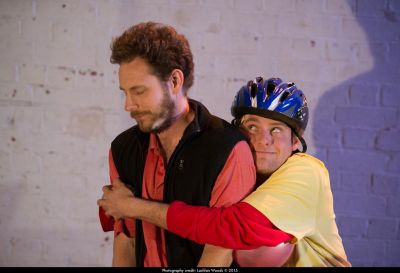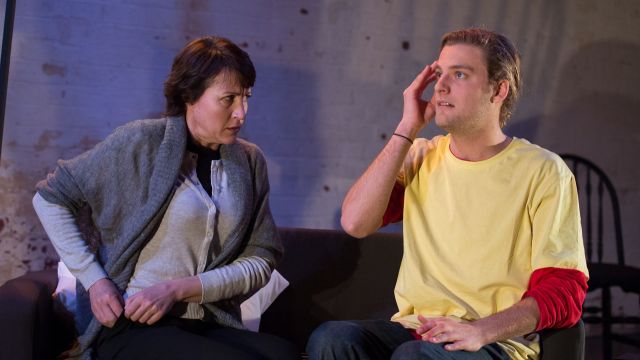Cuckoo
Mel (Natalie Carr) and Leo (Matthew Molony) are a suburban couple alienated from each other. He plays with Lego; she does crossword puzzles on her computer. They talk past each other. He wants a dog; she doesn’t. There’s talk of getting away somewhere, but it’s just talk. Suddenly, they are confronted with ‘Johno’ (Samuel Russo) – a man-child – who claims to have been in a bike accident just outside, but asks if they can make him some toast. Who is this guy? ‘You know who I am,’ says Johno. He is - that is, he claims to be - the child Mel and Leo lost at some unspecified time in the past…
Thus Cuckoo has an intriguing premise: the reappearance of a child presumed dead or, at least, lost forever. It’s a phenomenon that happens more often than one might think (just Google ‘reappearance of missing child’) and it fascinates and confuses people even when there is a rational explanation. Where has the child been? Are they the same or changed utterly? Are they even the real child or an imposter? And if the now older child is an imposter, why do the parents accept him or her? The phenomenon is the starting point for Agnieszka Holland’s disturbing but beautiful film Olivier, Olivier in which a boy rides off on his bike to his grandmother… and disappears. Six years later he – but is it really he? – returns.
 Kelsey Henderson’s set design is functional: all the action takes place in the living room or the kitchen, except for downstage limbo for some flashbacks. Bronwyn Pringle’s lighting serves the text and gives the flashbacks an eerie quality.
Kelsey Henderson’s set design is functional: all the action takes place in the living room or the kitchen, except for downstage limbo for some flashbacks. Bronwyn Pringle’s lighting serves the text and gives the flashbacks an eerie quality.
Sadly, however, Jane Miller does not do a great deal with the premise. In her program note, she says she hopes audiences find her play ‘funny, sad, bizarre and enigmatic’. Yes, it is intermittently funny, but the humour comes mainly from the couple’s amiable friend Dan (David Kambouris) and his near Pirandello-like obliviousness to the bizarre nature of what is happening, or it comes from ‘J’’s whiny child requests from a tall and good looking young man.
Yes, it is sad, but not very sad because Mel and Leo are rather undeveloped characters and Ms Miller neglects light and shade, opting for the gag over emotion. This is no reflection on Ms Carr or Mr Molony who do all they can with this material, not particularly helped by Alice Bishop’s flat staging.
Mel comes to accept Johno – or chooses to – as the long-lost son. Leo, it seems, never does. But that’s as far as it goes. The depiction of this conflict gets repetitious. We might infer that Mel needs to accept Johno as her son, but that’s a given rather than a dramatic development or a reveal. Is it no more than the fact that this mother has never accepted that her child will never return? That’s never really established. There are flashbacks to when Johno was a child – an autistic child, we infer – but these are uninformative and we never find out how or exactly when the real Johno disappeared. Maybe the replacement Johno is much nicer that the autistic kid that disappeared?
Rather than ‘enigmatic’, a better term might be ‘needlessly puzzling’. Another instance is that, suddenly, Johno speaks fluent French. Mel answers in French. Leo doesn’t understand French. This sequence – which is neither here nor there – falls into the category of ‘wouldn’t it be funny if…’ Or bizarre if… or enigmatic if…. And it is funny for a moment, until it is put in context and it suggests either that ‘J’ cannot possibly be the lost child, or that this imposter has ceased to care that he will be found out – or, again, it causes the audience to be distracted into speculation as to just where the lost child has been for however many years.

Whether Johno really is or isn’t the lost child returned (and there are many indications, intentional or not, that he simply isn’t) is not the point. Nor is Johno’s’ motive for showing up one night and making his claims the point. He does show up; that’s the ‘unreal’ starting point that we must accept and move on because of where it might take us. The return of the child surely must be a catalyst in the story of the parents, Mel and Leo, a disturbance that reawakens the past, that sharpens the latent fissures and conflicts in this marriage. But that is precisely where this play is lacking. An intriguing premise is not pursued. Like many an example of Australian storytelling, this play prefers being ‘funny’.
Michael Brindley
Photographer: Lachlan Woods.
Subscribe to our E-Newsletter, buy our latest print edition or find a Performing Arts book at Book Nook.

